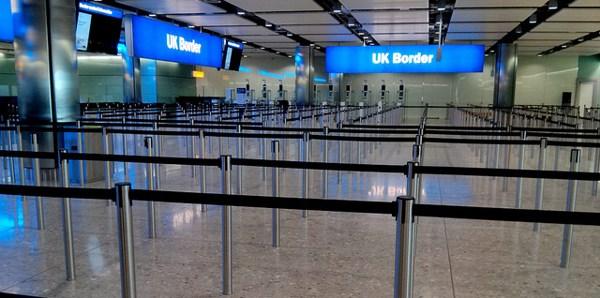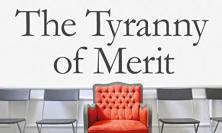Many of the most heated discussions ahead of the UK General Election are about a controversial topic: immigration. Each party has its own solution to the ‘problem’ of immigration, but the real problem is that the wrong questions are being asked, says Patrick Riordan SJ. He draws on the debates about migration in political philosophy to call on politicians to ‘show more respect for voters by offering policies which reflect serious consideration of the issues, values and principles at stake.’
In any debate there are opposed viewpoints on the issues at stake. On immigration, however, British politicians are currently engaged in a non-debate. They accuse their opponents of being soft on migration policy, of inept administration of relevant regimes, and of failing to expel or repatriate unwanted immigrants; but when it comes to the fundamental issues, there appears to be agreement between the major UK political parties.
There are genuine complaints about the overcrowding problems in schools and hospitals in those areas of the UK where significant numbers of new immigrants are located without adequate infrastructure provision. Competition for jobs, especially at the unskilled end of the labour market, also lends weight to the identification of migrant workers, especially from the European Union, as the source of difficulties. There are voices on all sides which recognise the great contribution that immigrants make to the country and its economy. But this too is dangerous: migrants are welcome and valued only on condition that they are of use to us and the British economy. The common assumption seems to be that immigration is the problem, and that the only viable solution is to control immigration.
So where is the debate? What issues are being addressed which genuinely open up questions such that real possibilities for alternative courses of action are explored? The current disagreements appear to focus on who is less tolerant and more ruthless in expelling the unwanted, and this unlikely to change in the run-up to the General Election.
In political philosophy, debates about migration tend to focus on one or both of two issues. On the one hand, there is the question of the rights of people to migrate, whereby refugees constitute a special case. On the other hand, there is the question of whether national communities have the right to close borders and exclude migrants. In these debates so formulated, proponents of all positions tend to make their case by appealing to rights, and so, pushed to extremes, John’s right to migrate confronts Mary’s right to exclude. When issues expose a direct conflict of rights like this, the investigation shifts to a consideration of the bases of rights and their justification. It cannot be a matter of simply asserting rights, but each right has to be explained as grounded, perhaps in some account of human persons and the human good. Otherwise the debate becomes a shouting match with each side proclaiming its right. However, exploration of the foundations and grounds of rights can expose the weakness of a position originally asserted as self-evident or impregnable, and the protagonists are obliged to shift their ground. Where the advocates of a right to exclude appeal also to a wider set of rights to support their understanding of democratic government in a liberal polity, they can find that the very same rights they rely upon for this defensive case provide their opponents with strong arguments against closed borders.
The need for borders is generally accepted, since the delineation of the jurisdiction of any authority, whether local, national or international, must be clear. Accordingly the issue is rarely about the need for borders, but about what kind of border regime is necessary and justified. An interesting exception is that of some cosmopolitans who question the validity of any border insofar as it would limit the obligations owed in justice to persons. They cannot see how a border could make a difference to what justice requires of people in their behaviour towards others: justice requires that I respect the dignity of someone who lives across the border from me no less than that of my immediate neighbour who lives across the street. This cosmopolitan argument is countered by those who point to the associative duties which arise from being a citizen and a member of a political community, such as the obligation to pay taxes to support health, education and welfare systems. Such duties are geographically bounded by the borders which enclose the population of those obliged to pay. However, this particular debate is only marginally relevant to the migration issue, since it does not address the questions of admission or exclusion.
When liberal democracies appeal to fundamental rights to justify their preferred form of government, they cannot avoid the question of whether those fundamental rights include a human right to migrate. Liberal regimes are so-called because they are predicated on the freedoms of individuals which the liberal state commits itself to respect and protect. It follows that any liberal state worthy of the name is obliged to recognise the liberties of those who desire to immigrate and to respond with some reasonable accommodation. For instance, Loren Lomasky argues that a liberal state, to be consistent with its own liberal principles, must be prepared to maintain soft borders and admit such immigrants for which there is no serious ground (such as criminality) for exclusion.[1] With such a strong view of the equal entitlement of all to respect for their liberties, boundaries appear to be arbitrary. Lomasky concedes the point about sharing the cost of provision of public goods (in the classic liberal case, confined to the provision of infrastructure for the maintenance of government and security, and the doing of justice) but qualifies that the willingness to enter into the community on the basis of bearing a fair share of such costs should override that ground for exclusion. As a classical liberal he has little sympathy for the concern to protect the welfare state, noting that the desire to exclude in order to secure the benefits of the welfare state exclusively for those who already enjoy them is morally questionable.
Joseph Carens has been making a similar case for several years.[2] Surveying various familiar arguments within liberal political philosophy, he concludes that none of these established theories justify closed borders and the right to exclude. Peter Meilaender is critical, but he admits that Carens poses a difficult challenge for liberals: shouldn’t people who accept fundamental personal freedoms support open borders?[3] Carens’s argument, which seeks to uphold the freedom to migrate by challenging the right to exclude, obliges liberals to engage in a debate about foundations. If the reason given for the entitlement to exclude is the protection of some distinctive culture, then that raises the question of how liberalism might be compatible with some version of the perfectionist principle which privileges particular features of a culture. Carens directly challenges the case made by Michael Walzer that exclusion is justified by the right of communities to self-determination.[4] If it is the case that a community’s shared meanings deserve protection, and could warrant maintaining closed borders, a paradox arises for a political community in which liberal respect for freedoms is a central part of its culture. Societies with liberal universalist identities would have to be committed to open borders, assuming that those admitted would also endorse the universalist valuation of the human rights of every person.
Several debates address the democratic foundations of national communities’ rights to exclude. But as in the case with the appeal to liberal principles, the appeal to democratic principles is also risky. For instance, if democracy invokes the will of the people, then one might wonder who exactly constitutes the relevant demos, the people entitled to decide, and at the same time, the people to whom justification is owed. Arash Abizadeh employs democratic theory to raise these questions.[5] Democrats must be sensitive to the risk of excluding people, and Abizadeh applies this concern to the question of justification and asks to whom the justification of closed border regimes should be addressed. As he outlines it, the democratic theory of popular sovereignty holds that the exercise of political power is legitimate, ‘only insofar as it is actually justified by and to the very people over whom it is exercised, in a manner consistent with viewing them as free (autonomous) and equal’.[6] Democracy so understood requires that those affected by some measure actually have the opportunity to make their case either in favour or against. He draws the conclusion that peoples committed to democratic principles may not unilaterally decide on the border regime. They must include in their deliberations the very people who stand to be excluded by a closed border policy: the migrants themselves. This is challenging but not implausible, given the widespread acceptance that a state’s use of coercion requires justification, and that the justifying arguments must be addressed also to those over whom the coercion is exercised. Since the maintenance of closed borders involves coercion, this case cannot reasonably be exempted from the standard demand for justification.
Is it democratic to confine the entitlement of participation in the consultation to those who got there first, so to speak? This is not the only ‘democratic’ idea introduced into the debates. In rejoinder to the accusation of an unwarranted restriction of the demos, the right to free association is presented as grounding the entitlement to exclude.[7] Christopher Wellman argues that the recognised freedom of association must entail a freedom not to associate. The freedom to marry must include the freedom not to be forced to marry, or indeed to marry a particular person. By analogy with this personal right there must be a linked right to exclude from freely-formed clubs or organisations such people as are not invited. As with many personal rights, autonomy, the capacity for self-determination, is at the heart of the claimed right to free association. Without this additional right to exclude, it is impossible to exercise the autonomy of self-determination. This is thought to be particularly significant where the members are empowered to change the constitution and the nature of the association. Wellman’s argument is similar to but not the same as Walzer’s, which supposed a particular culture with distinctive qualities worth preserving. Wellman doesn’t suppose anything special about the excluding community, other than the right of actual members of the association to choose with whom they will associate.
Wellman admits that there are difficulties in drawing analogies between an individual’s right – e.g. to marry, understood as a freedom of association – and the freedom of association of a society upon which a right to exclude might be grounded. For most people, citizenship of their polity does not result from deliberate joining. It is a matter of good fortune to have been born into a context in which so many benefits of security, welfare and rights are assured. At the same time, opponents of closed borders are prepared to acknowledge the validity of such concerns as are expressed by appeal to the freedom of association. The possibility that a community could find itself exposed to the risks of significant numbers of new additions bringing unwanted changes to the constitution and values of the community is admitted. New forms of intolerance could become the norm, or new directions in foreign policy might be adopted as a result of a significant change in the composition of the electorate of a democracy. However, while such concessions are made, it is also pointed out that the volume of immigration required to achieve such drastic changes is so unlikely that the risk is negligible in relation to current levels of immigration.[8] There is no denying the long-term impact of incorporating new populations with their cultures, but this is something the United Kingdom has been able to do successfully through history. Besides, immigration is not the only source of continuing change, so the need to accommodate change as a constant demand on any community cannot be linked to immigration alone.
This survey of philosophical debates about migration and immigration reveals that while the issues are important and reasonable arguments can be made in favour of more open border regimes, there is no single knock-down argument which trumps all others on either side. Unfortunately, the actual political debates do not reflect this complexity. It is highly desirable that politicians would show more respect for voters by offering policies which reflect serious consideration of the issues, values and principles at stake, and not just cater to the anxieties of the few and the agenda set by popular media.
From such a review of the philosophical arguments, we can be sympathetic to the remarks of Pope John Paul II in his World Day of Peace message in 2001, which explicitly addressed the topic of migration:
In such a complex issue there are no ‘magic’ formulas; but still we must identify some basic ethical principles to serve as points of reference. First of all, it is important to remember the principle that immigrants must always be treated with the respect due to the dignity of every human person. In the matter of controlling the influx of immigrants, the consideration which should rightly be given to the common good should not ignore this principle. The challenge is to combine the welcome due to every human being, especially when in need, with a reckoning of what is necessary for both the local inhabitants and the new arrivals to live a dignified and peaceful life. The cultural practices which immigrants bring with them should be respected and accepted, as long as they do not contravene either the universal ethical values inherent in the natural law or fundamental human rights.[9]
There are several values here which demand respect, but which might be balanced in different ways. What alternative forms of balance between them are now on offer to UK voters? What distinguishes the parties in terms of imaginative proposals? Is it not conceivable that some party will be bold enough to affirm that the resources of our country and economy are sufficient to allow us to share them with many more people; that we are enriched by the acceptance of many migrants who contribute with their presence, their culture, their work and their taxes; and that the best traditions of the nation are realised by a generous and welcoming attitude which considers not just what is best for Britain, considered narrowly, but what is best for everyone?
Patrick Riordan SJ is a member of the Heythrop Institute: Religion and Society.
[1] Loren Lomasky, ‘Towards a Liberal Theory of National Boundaries’, in Boundaries and Justice. Diverse Ethical Perspectives, edited by David Miller and Sohail H. Hashmi (Princeton; Oxford: Princeton University Press, 2001).
[2] Joseph H. Carens, The Ethics of Immigration (Oxford: Oxford University Press, 2013).
[3] Peter C. Meilaender, ‘Liberalism and Open Borders: The Argument of Joseph Carens’, International Migration Review 33.4 (1999) 1062-1081.
[4] Michael Walzer, Spheres of Justice (New York: Basic Books, 1983), p. 62.
[5] Arash Abizadeh ‘Democratic Theory and Border Coercion: No Right to Unilaterally Control Your Own Borders’ Political Theory 36.1 (2008) 37-65.
[6] Ibid. p. 41.
[7] Christopher Heath Wellman, ‘Immigration and Freedom of Association’ Ethics 119.1 (2008) 109-141. See also Christopher Heath Wellman and Phillip Cole, Debating the Ethics of Immigration: is there a Right to Exclude? (Oxford: Oxford University Press, 2011).
[8] Michael A. E. Dummett, On Immigration and Refugees (London : Routledge, 2001).
[9] http://w2.vatican.va/content/john-paul-ii/en/messages/peace/documents/hf_jp-ii_mes_20001208_xxxiv-world-day-for-peace.html, §13.






